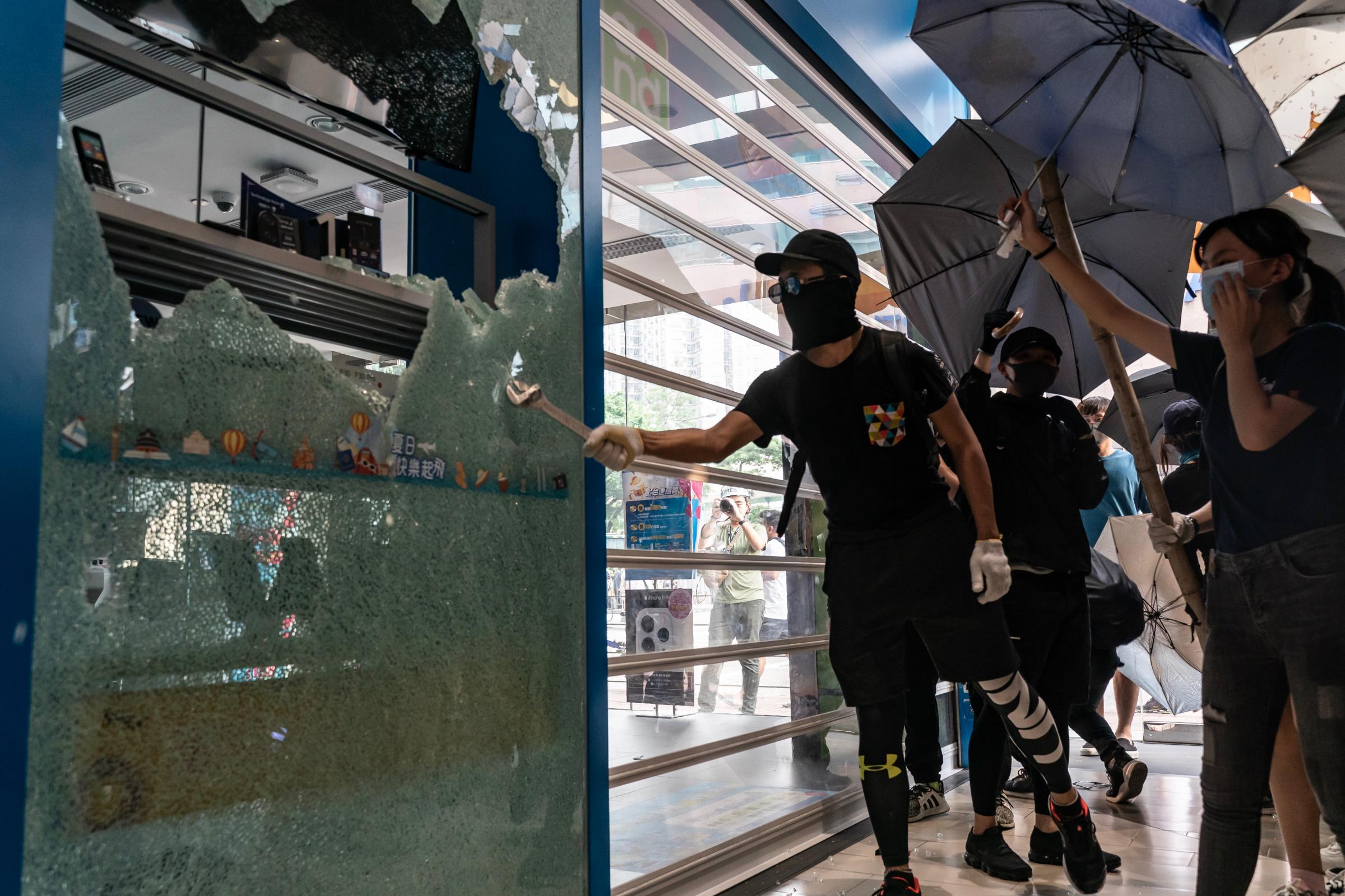The United Nations High Commissioner for Human Rights, Michelle Bachelet, said Saturday that the extent of violence during Hong Kong’s four months of anti-government unrest warrants an independent probe.
Reuters reported that Bachelet called on Hong Kong authorities to launch an “effective, prompt, independent and impartial investigation” into the handling of the protests, which to date have led to more than 1,100 injuries, 31 of them sustained overnight.
Bachelet’s remarks came as Hong Kong entered a second day of protest against a ban on the wearing of facial coverings—an emergency measure to curb the unrest that has met with a disastrous reception.
On Saturday afternoon, hundreds began marching through downtown Hong Kong chanting “Fight for freedom! Stand with Hong Kong!” and “I have the right to wear a mask!” Marchers occupied major streets and almost all wore facial coverings in defiance of the ban, which applies to all public gatherings and renders violators liable to a year in jail.
Along Chater Road, beside the Mandarin Oriental Hotel, protesters unfurled massive banners reading “Glory to Hong Kong” and “Murderous Hong Kong Police.” Protests also broke out in three areas of the Kowloon peninsula, and in the northern towns of Sheung Shui, where the storefronts of businesses with mainland Chinese connections were attacked and vandalized, and Yuen Long, where a tense standoff took place with riot police. A clash also took place at the small port of Aberdeen, on the southern side of Hong Kong Island.
Of the injuries sustained in Friday’s protests against the anti-mask measure, three were serious. A police officer narrowly escaped a mob that attacked him with a petrol bomb, momentarily set him alight, and attempted to seize his gun. Local media reported that a 14-year-old boy suffered a gunshot wound to the leg—the second teen to be hit with a live round in recent days. He was reportedly charged with rioting and assaulting a police officer.
Barring intermittent services to the airport, the entire train network remained suspended today after multiple stations, facilities, and a train were attacked by anti-government protesters. Banks, supermarkets, shopping malls and many stores remain closed after a night of destruction that saw fires lit and shopfronts smashed.
Government facilities such as libraries, museums, and performance venues are also shuttered and major streets were deserted. Some Twitter users reported a run on ATMs, saying they were running out of cash. Panic buying took place at the few grocery stores that were open, with shoppers queuing as long as two and a half hours for staples.
Protesters also smashed scores of traffic lights overnight, causing disruptions to morning motorists. Businesses were urged to “make flexible work arrangements for staff” because of the conditions.

In a taped video message broadcast Saturday afternoon in Cantonese, Hong Kong’s beleaguered top official, Carrie Lam, decried what she called “extremely horrifying violence.” She said “the radical behavior of the masked protestors was shocking. The extent of the damage was reckless and unprecedented.”
Appearing less conciliatory than she has in recent addresses, she said: “The rioters’ extremist behavior brought a very dark night upon Hong Kong, and caused society to be half paralyzed. Everybody is worried, concerned and scared. The government has the strongest determination to stop the violence.”
Lam ended her address with an appeal to the Hong Kong public “to condemn the violence together and distance themselves from the rioters.”
The mask ban came into effect at midnight under the colonial-era Emergency Regulations Ordinance after the High Court refused to grant an injunction against it brought by two activists.
Protesters see the measure as the start of a broader crackdown on their fledgling democracy movement and Lam has not ruled out invoking more emergency powers, describing the situation as “fluid and evolving.”
The Secretary for Justice, Teresa Cheng, refused to say if there were plans for martial law but emphasized that the government was considering all legal means at its disposal to defuse the crisis, Hong Kong’s government-funded broadcaster reported.
The ongoing political crisis was sparked by a now withdrawn extradition bill, which would have allowed the rendition of fugitives to mainland China for the first time. Opposition to the bill quickly grew into a democratic rebellion against the unrepresentative, Beijing-backed government. Many protesters are also calling for self-determination or independence for the former British possession, which was retroceded to China in 1997 after 156 years of colonial rule.
Protests are expected to continue Sunday, with a large rally scheduled to take place at Victoria Park.
—With reporting by Hillary Leung / Hong Kong
More Must-Reads from TIME
- Cybersecurity Experts Are Sounding the Alarm on DOGE
- Meet the 2025 Women of the Year
- The Harsh Truth About Disability Inclusion
- Why Do More Young Adults Have Cancer?
- Colman Domingo Leads With Radical Love
- How to Get Better at Doing Things Alone
- Michelle Zauner Stares Down the Darkness
Contact us at letters@time.com